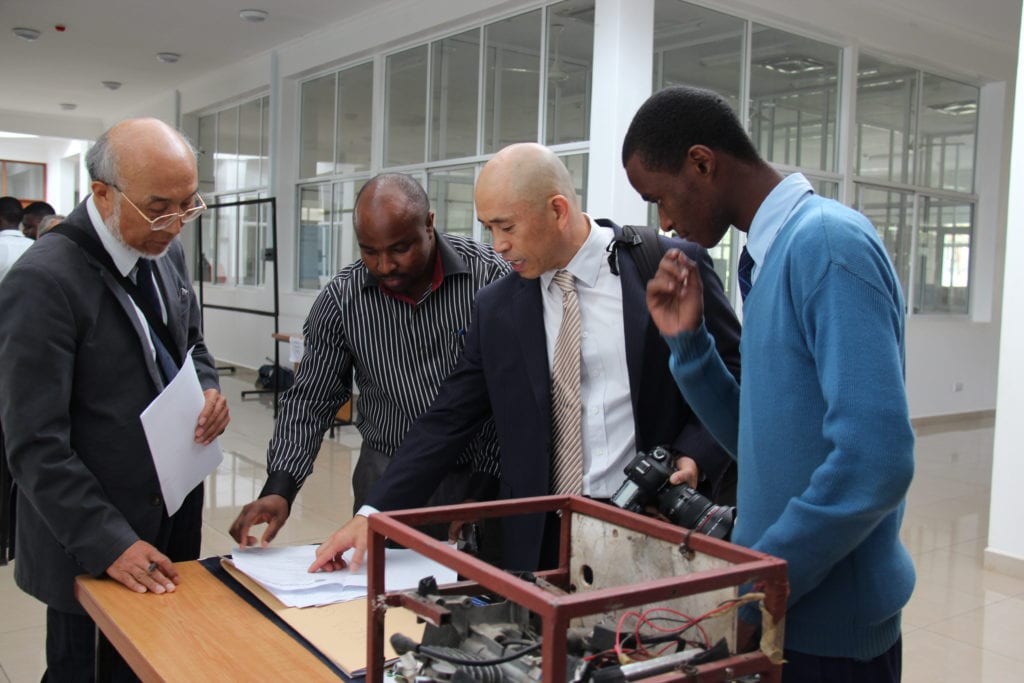Students at The School of St Jude have scooped up awards at the recent Science Fair at the Nelson Mandela African Institute of Science and Technology in Arusha.
The institute invited some of the best students from a range of local schools including St Jude’s and Ilboru Secondary School to showcase their innovative scientific and technological projects at the fair on Friday.
The institute’s Fair and Nobel Symposium ran for three days as part of Nelson Mandela week celebrations. The symposium speakers spoke of achievements of last year’s Nobel Prize winners in Physics, Chemistry, Literature, Peace and other areas, to inspire young talented minds to be inventive and creative.
17 students from St Jude’s featured seven projects at the fair, from an SMS polling project for voting to a refrigerator which doesn’t run on power and is designed to help people in local, rural communities who don’t have electricity.
Ilboru Secondary School won first prize while St Jude’s secured second place for its students’ project of redesigning a helicopter. St Jude’s also received a third-place prize for its demonstration project for Gamma rays detectors which can check substances and dangers within an environment. Form 6 students, Hosiana and Emmanuel, worked on the idea with Professor Chary from Canada.
“The chemicals which are used in industry and mines contain a lot of radioactive elements and emissions, so the detector can be used to check a wide range of substances in our environments or any dangers which could harm people in our society or those working in those areas,” said St Jude student, Hosiana.
The Form 6 students who participated in the event felt it helped to further develop their confidence and skills in the lead up to their graduation.
“This event has established a network of professionals, including technologists, academics, engineers and professors to rely upon in the future when we need mentoring and support for science based competitions,” said Mr. Mcharo, St Jude’s Head of Physical Science Department and Assistant Academic Master. “For our school, this is a huge step to be recognised by an international university.”
During the awards, Professor Chary noted the high calibre of the projects at the fair and how all of the students rose to the occasion. Every student who participated in the event received a certificate, as well as the winners receiving medals and trophies.

Professional development of our teachers is very important to us and we are always looking for ways for them to learn new teaching methodologies or resources in their classes.
This month, a group of United States teachers volunteered their time to come to our school to share their knowledge and expertise with our Tanzanian teachers. Most of them come from Louisville Collegiate School except for two, who teach at other schools and institutions and all had to apply to be part of it. Collegiate and St Jude’s are developing a partnership and it’s the second year that the program has been running at our school. It proved to be a big success.
Each of the American teachers teamed up with one of our Tanzanian teachers for two weeks, to do team teaching, planning and delivering lessons from the NECTA curriculum together. Some took a biology class together while others took technology, English and various subjects. Our teachers were enthusiastic to learn from them about how to improve their teaching and learning skills and were able to absorb the information more fully as the American teachers were by their side and in the classes with them.
James Calleroz White, who is the Head of the Louisville Collegiate School, visited classes and held a series of conversations about teaching, learning and leading with the leaders across the campuses.
“We’re very happy with how the exchange program worked and we found with an extra teacher, you got a better lesson as the student was able to learn something that had much better detail because of the good preparation and cooperation between the two teams,” said St Jude’s Upper Primary School Headmaster, Peter Manjalla. “Our upper, lower and secondary primary school leaders have now decided that we’re jointly going to look at ways to improve maths results and we’re excited about further looking at how to mprove learning and teaching so as to benefit our students.”
As well as in the classroom, the US teachers set up a ‘club’ with the Standard 7 students so they could do fun yet enriching activities with them. They included science demonstrations, vocabulary games, outdoor running games and a range of other exercises.
The American teachers also learnt a lot from our teachers as well about including more designated reading times for students and they gave them an overview about Tanzania which they could share with students and colleagues back at home.